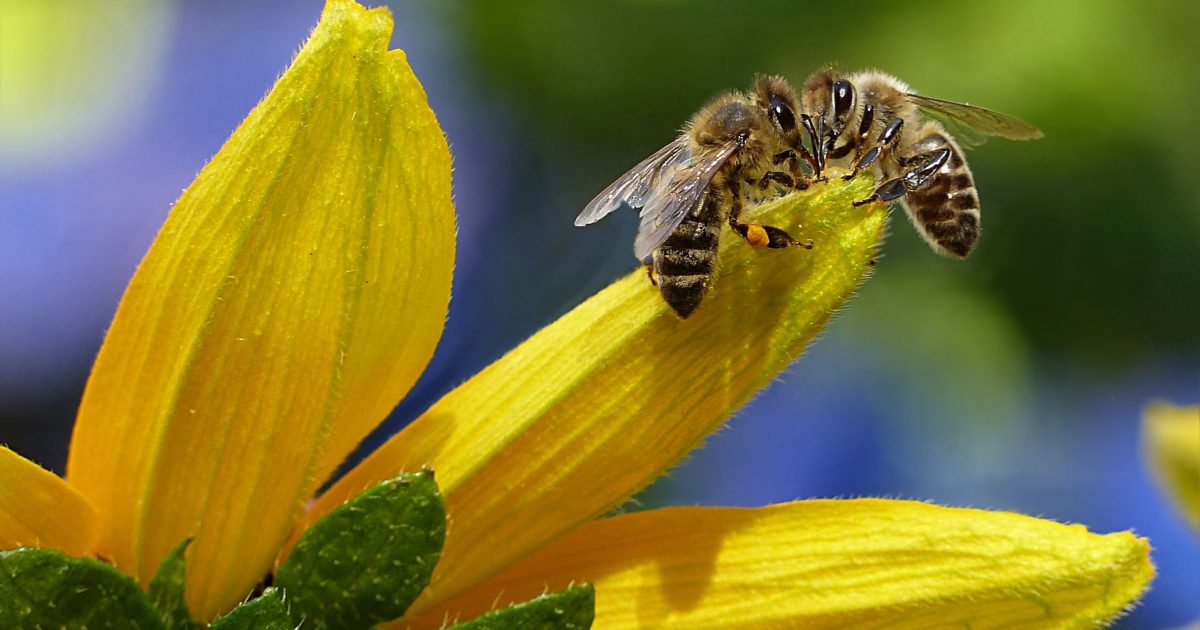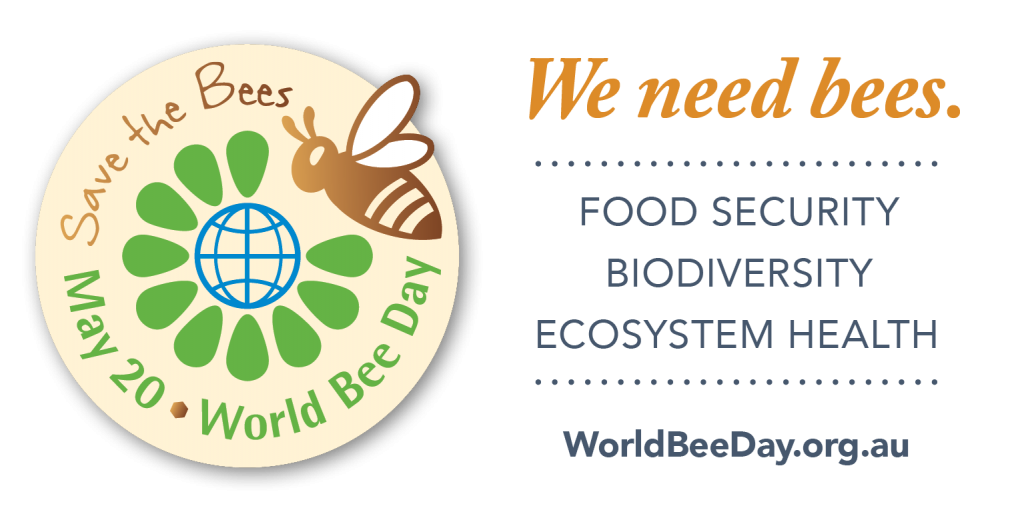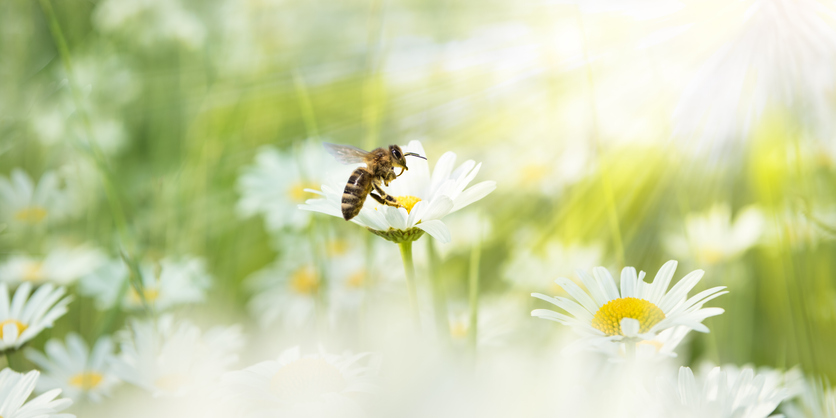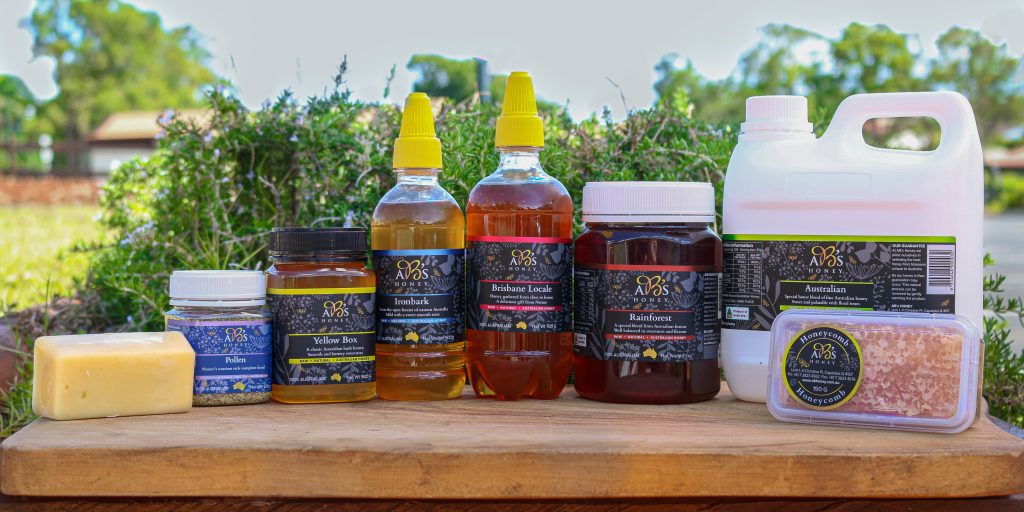Did you know that 80% of the world’s flowering plant species, 75% of the world’s food crops, and 35% of agricultural land, depend on pollinators like bees? In fact, two-thirds of Australia’s food supply is bee-dependent. There is no better time to learn about the critical role the bees play in our ecosystems than World Bee Day, May 20.
World Bee Day on May 20 is especially dedicated to our bees. It aims to educate people about the importance of bees and how we can help save the hardest working insects from extinction. The United Nations agreed the need for a World Bee Day in December 2017. They chose May 20 to be the date as it’s the birthday of Anton Jansa (1734-1773), the pioneer of modern beekeeping.
2022 is the fifth World Bee Day, and this year the theme is “Bee engaged: Build Back Better for Bees“, highlighting the need to build a better environment for all bee species.
Bees – for life on earth
We all depend on bees. Even if you don’t like honey (and if you don’t, trust us – you just haven’t found the right one!) bees are responsible for providing a huge number of the foods we eat. In Australia, the biggest annual movement of livestock happens every August when millions of bees and their hives are taken to the almond orchards of Victoria. The bees pollinate the almond trees, and a number of other crops as beekeepers take scheduled stops along their way home. A lot of almonds are exported, meaning bees are important for the economy too!
But bees are increasingly under threat and are unable to survive without our support and possible intervention. Continued use of glyphosate, pesticides, habitat loss and climate change have an impact on all bee species, not just our honey bees.
The loss of bees will not only lower the availability of food crops but also have a detrimental effect on the ecosystem health and biodiversity of this planet.
Ecosystem health
Bees keep our ecosystem in balance, and most of us have no idea that bees are providing us with much more than just honey.
They deserve huge thanks for their work as perfect pollinators of the many plants that provide us with food, flowers, and beautiful gardens and parklands. As pollinators, bees support the growth of trees, flowers, and other plants. In turn, these trees, flowers, and other plants provide food and shelter for creatures large and small. Without bees, the world would be a very different place, and a difficult environment to survive in.
Biodiversity
Biodiversity refers to the variety of plants, animals, and other organisms present on Earth. Many plant species are essential for the continuity of life on earth, and they, in turn, cannot survive without bees. Bees contribute to complex, interconnected ecosystems that allow other species to co-exist.
Bees are vital for the preservation of ecological balance and biodiversity in nature. They provide one of the most recognisable ecosystem services; making food production possible.
Food security
Pollinators like bees provide us with the security that we have sufficient food crops to sustain us. Bee pollination is responsible for the production of nearly two-thirds of Australia’s agricultural products. A decline in their population would have a disastrous effect on our health and economy. To minimise the risk to our food security, we should minimise intensive farming, use of pesticides, and the destruction of their habitat.
How you can help save the bees
There are lots of little things you can do to help, and they don’t require a lot of effort. Try these suggestions:
Buy real Australian honey
Believe it or not, some of the honey products you buy don’t contain 100% pure honey. Some have been diluted with corn syrup or sugars to increase volume and reduce price. Others are blended with imported honey, which may contain organisms that could damage our ecosystem. Some contain no honey at all! Buying real honey ensures that there will always be a demand for bees and a reason for beekeepers to keep them. Find out more about real and processed honey here: www.simplyhoney.com.au/raw-vs-regular-honey
Tip: We only sell 100% pure, raw, Australian honey at Simply Honey!
“No Mow May”
Although it’s called No Mow May, we recommend leaving your lawn unmowed any time you have wildflowers blooming in the grass. Bees love clover, daisies, and dandelions. These usually bloom just when bees have depleted their winter honey stores and are looking for new food sources.
Tip: Try to mow in the evening after bees have returned to their hives.
Plant a bee-friendly garden
Bees love purple flowers, flowers that are easy to land on, and flowers that are available all year round. If you are a keen gardener, see our tips for a bee-friendly garden and see where you can make a few changes to attract more of these pollinators to your garden.
Tip: Instead of using harmful pesticides and weedkillers, consider “companion planting“. There are lots of complimentary plants that have a positive effect on each other.
Provide resting spots for bees
Even if you don’t have a garden, you can help bees by providing safe resting spots and shelter from weather. Many native bees are solitary and hide in hollow canes and crevices. Put a variety of different diameter lengths of bamboo cane into a flower pot laid on its side to make a bee hotel. See these bee hotel ideas. Bees also appreciate a “bee bath” – a shallow dish of water with lots of stones to safely land on.
Spread the word
Let everyone know about the important role bees play. Spread the word, and don’t forget to hashtag #WorldBeeDay
Get involved and celebrate World Bee Day every year
There might be a local event happening near you. Check this map to see. Use World Bee Day to promote the role of bees in sustaining diverse ecosystems. We can all help strengthen the link between food security and biodiversity for future generations. Try these tips:
- Plant a variety of native plants that attract bees for pollination
- Plant organic or heirloom seeds that haven’t been treated with chemicals
- Let dandelions and clover bloom
- Plant a herb garden or box. Bees particularly love basil, rosemary, and lavendar
- Buy only 100% Australian raw honey to enhance beekeeping practices
- Avoid using pesticides, herbicides, and fungicides, especially those containing glyphosate
- Replace sugar with honey in drinks and recipes. (Check out our honey recipes!)
- Start your own awareness campaign to protect our forest ecosystems
- Report swarms of bees. Contact your local beekeeper or beekeeping organisation to save them. Don’t kill them!
- Diversify crops as much as possible if you are a farmer
- Organise a May 20 Honey Breakfast at your local school to start a conversation. Breakfast suggestions include:
- Toasted crumpets and pancakes with fruit and honey
- Natural (locally produced!) yoghurt with fruit and honey
- Porridge or granola with lashings of fruit and honey
- Banana smoothies made with honey
- Make a bee drinking station. A saucer of water with landing pebbles will make the world of difference
- Raise awareness in your social circle by sharing this blog and the World Bee Day website – worldbeeday.org.au
By purchasing honey and bee products from Simply Honey, we guarantee you are directly supporting the Australian honey industry and our amazing hard-working Australian beekeepers.
Further reading
You might also enjoy reading:
A day in the life of an Australian beekeeper
Transporting millions of bees for the annual almond pollination



